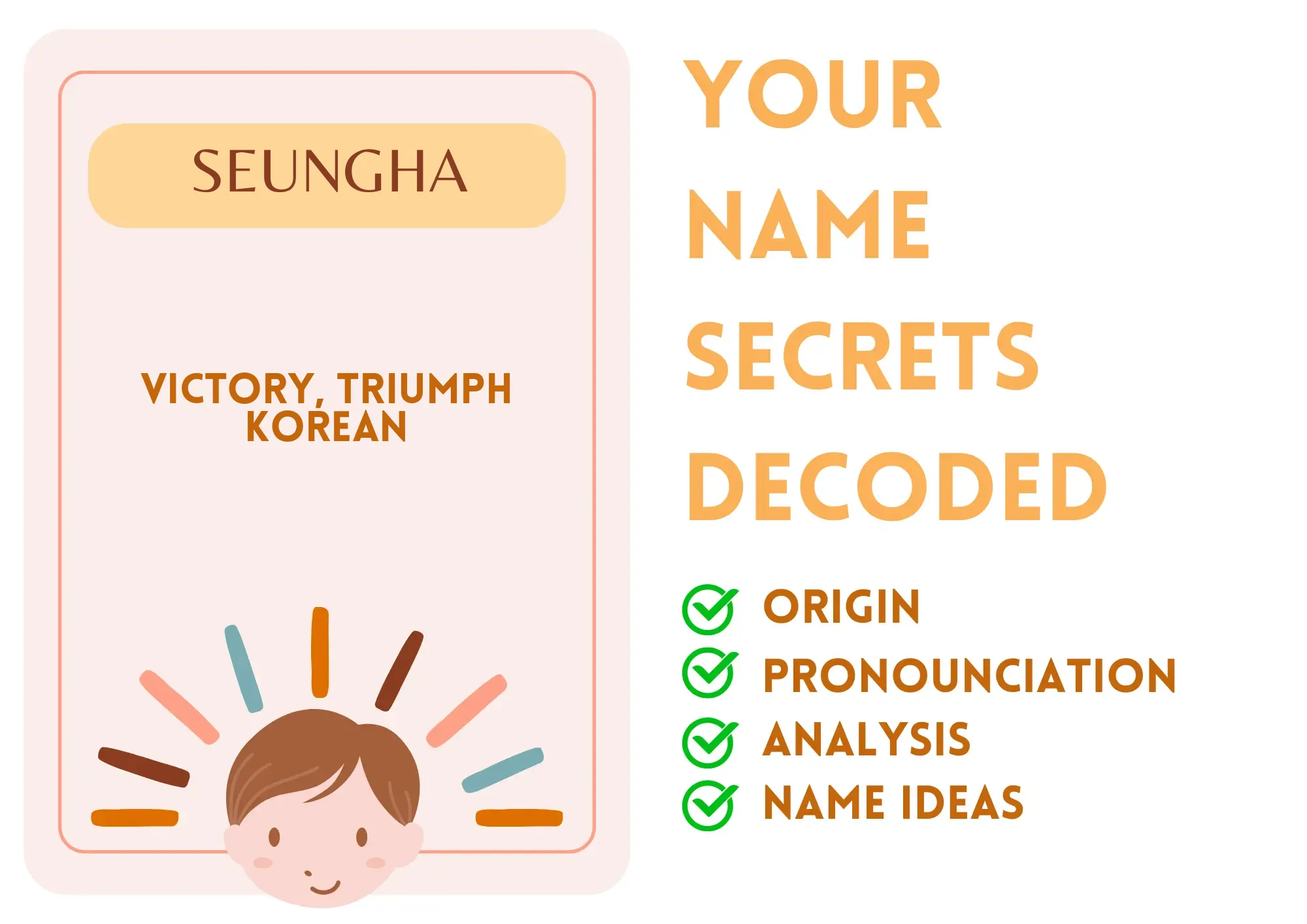
Seungha
Seungha is a unique and culturally rich name of Korean origin. The name is typically associated with meanings of 'victory' or 'triumph' depending on the hanja (Chinese characters) used. It is predominantly used for boys but can also be embraced as a unisex name.
In Korean culture, names are often chosen for their positive meanings, and Seungha is no exception. The name symbolizes success and can be perceived as an auspicious choice, promising good fortune to the bearer. It is regarded positively by many, often representing determination and ambition.
Seungha is easy to write and pronounce in both English and Korean, adding to its appeal. Common nicknames may include Seun or Gha. Due to its unique sound and meaning, it stands out amongst traditional names.
Basic Information
Gender: Boy
Sounds Like: Soon-gha
Pronunciation Explanation: The first syllable sounds like 'Soon,' with the emphasis on 'gha' pronounced like 'gah'.
Summary and Meaning
Meaning: victory, triumph (Korean)
Origin: The name Seungha has its roots in Korean culture, utilizing hanja to convey its meaning.
Usage: Seungha is mainly recognized as a masculine name but has some unisex appeal.
Name Number (Chaldean)
Name Number (Pythagorean)
Popularity (Global Rank)
Overall: 176481
Boys: 72681
Most Popular in
Religious and Cultural Significance
Religion: Buddhism
Background: In Korea, many people are influenced by Buddhist values, which often reflect in the meanings of names chosen for their children.
Cultural Significance: Seungha is appreciated within Korean society for its uplifting meanings, aligning with cultural ideals of success and resilience.
Historical Significance: Historically, names like Seungha have been associated with winning traits in various contexts, contributing to the idea of familial pride among descendants aiming for success.
Popular Culture
Literature and Mythology: While not heavily featured in classic literature, names with similar sounds or meanings often appear in Korean myths and legends.
Movies and Television: Characters bearing the name Seungha or its variations appear in Korean dramas, often depicted as ambitious or determined characters.
Feelings and Perceptions
Perception: Seungha is often perceived positively, associated with notions of success and ambition, valued in Korean culture.
Positive Feelings: Strong, aspirational,unique, favorable, optimistic.
Negative Feelings: Some may find it difficult to pronounce correctly without guidance.
Practical Considerations
Ease of Writing and Calling: The name Seungha is relatively straightforward to write. It's phonetic and simple in its structure, with two syllables that are easy to articulate.
Common Typos and Misspellings: Seung-ha,Seungho,Seungah,Seung-ha
Common Nicknames: Seun,Gha,Suh
Seungha Popularity
Seungha Usage and Popularity By Country
| Country | Rank (Overall) |
|---|---|
| South Korea | 1571 |
| Canada | 61528 |
| Australia | 68209 |
| Netherlands | 70785 |
| United Kingdom | 74991 |
| United States | 109151 |
Seungha Usage and Popularity By City
| City | Rank (Overall) |
|---|---|
| Sydney | 24786 |
| London | 46025 |
Compatibility Analysis
Famous Persons Named Seungha
No results found for Seungha.
Related Names
Similar Sounding Names:
Seung,Sung,Suna,Sena
Similar Meaning and Related Names:
Sibling Name Ideas (Brothers):
Joon 
N/A
